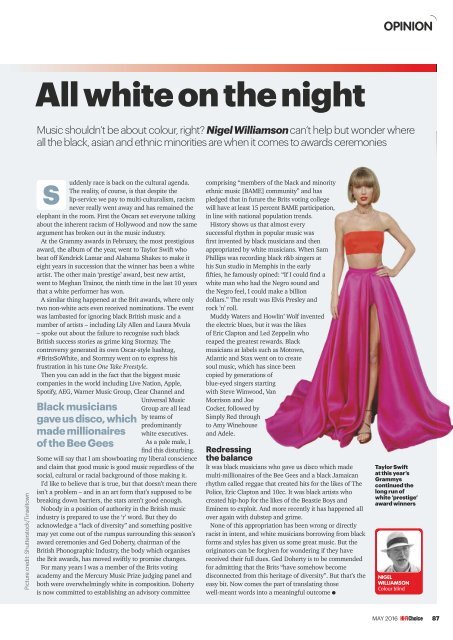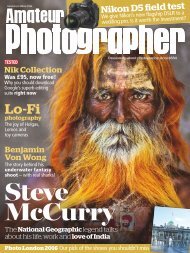You also want an ePaper? Increase the reach of your titles
YUMPU automatically turns print PDFs into web optimized ePapers that Google loves.
OPINION<br />
All white on the night<br />
Music shouldn’t be about colour, right? Nigel Williamson can’t help but wonder where<br />
all the black, asian and ethnic minorities are when it comes to awards ceremonies<br />
Picture credit: Shutterstock/Tinseltown<br />
S<br />
uddenly race is back on the cultural agenda.<br />
The reality, of course, is that despite the<br />
lip-service we pay to multi-culturalism, racism<br />
never really went away and has remained the<br />
elephant in the room. <strong>Fi</strong>rst the Oscars set everyone talking<br />
about the inherent racism of Hollywood and now the same<br />
argument has broken out in the music industry.<br />
At the Grammy awards in February, the most prestigious<br />
award, the album of the year, went to Taylor Swift who<br />
beat off Kendrick Lamar and Alabama Shakes to make it<br />
eight years in succession that the winner has been a white<br />
artist. The other main ‘prestige’ award, best new artist,<br />
went to Meghan Trainor, the ninth time in the last 10 years<br />
that a white performer has won.<br />
A similar thing happened at the Brit awards, where only<br />
two non-white acts even received nominations. The event<br />
was lambasted for ignoring black British music and a<br />
number of artists – including Lily Allen and Laura Mvula<br />
– spoke out about the failure to recognise such black<br />
British success stories as grime king Stormzy. The<br />
controversy generated its own Oscar-style hashtag,<br />
#BritsSoWhite, and Stormzy went on to express his<br />
frustration in his tune One Take Freestyle.<br />
Then you can add in the fact that the biggest music<br />
companies in the world including Live Nation, Apple,<br />
Spotify, AEG, Warner Music Group, Clear Channel and<br />
Black musicians<br />
gave us disco, which<br />
made millionaires<br />
of the Bee Gees<br />
Universal Music<br />
Group are all lead<br />
by teams of<br />
predominantly<br />
white executives.<br />
As a pale male, I<br />
find this disturbing.<br />
Some will say that I am showboating my liberal conscience<br />
and claim that good music is good music regardless of the<br />
social, cultural or racial background of those making it.<br />
I’d like to believe that is true, but that doesn’t mean there<br />
isn’t a problem – and in an art form that’s supposed to be<br />
breaking down barriers, the stats aren’t good enough.<br />
Nobody in a position of authority in the British music<br />
industry is prepared to use the ‘r’ word. But they do<br />
acknowledge a “lack of diversity” and something positive<br />
may yet come out of the rumpus surrounding this season’s<br />
award ceremonies and Ged Doherty, chairman of the<br />
British Phonographic Industry, the body which organises<br />
the Brit awards, has moved swiftly to promise changes.<br />
For many years I was a member of the Brits voting<br />
academy and the Mercury Music Prize judging panel and<br />
both were overwhelmingly white in composition. Doherty<br />
is now committed to establishing an advisory committee<br />
comprising “members of the black and minority<br />
ethnic music [BAME] community” and has<br />
pledged that in future the Brits voting college<br />
will have at least 15 percent BAME participation,<br />
in line with national population trends.<br />
<strong>Hi</strong>story shows us that almost every<br />
successful rhythm in popular music was<br />
first invented by black musicians and then<br />
appropriated by white musicians. When Sam<br />
Phillips was recording black r&b singers at<br />
his Sun studio in Memphis in the early<br />
fifties, he famously opined: “If I could find a<br />
white man who had the Negro sound and<br />
the Negro feel, I could make a billion<br />
dollars.” The result was Elvis Presley and<br />
rock ’n’ roll.<br />
Muddy Waters and Howlin’ Wolf invented<br />
the electric blues, but it was the likes<br />
of Eric Clapton and Led Zeppelin who<br />
reaped the greatest rewards. Black<br />
musicians at labels such as Motown,<br />
Atlantic and Stax went on to create<br />
soul music, which has since been<br />
copied by generations of<br />
blue-eyed singers starting<br />
with Steve Winwood, Van<br />
Morrison and Joe<br />
Cocker, followed by<br />
Simply Red through<br />
to Amy Winehouse<br />
and Adele.<br />
Redressing<br />
the balance<br />
It was black musicians who gave us disco which made<br />
multi-millionaires of the Bee Gees and a black Jamaican<br />
rhythm called reggae that created hits for the likes of The<br />
Police, Eric Clapton and 10cc. It was black artists who<br />
created hip-hop for the likes of the Beastie Boys and<br />
Eminem to exploit. And more recently it has happened all<br />
over again with dubstep and grime.<br />
None of this appropriation has been wrong or directly<br />
racist in intent, and white musicians borrowing from black<br />
forms and styles has given us some great music. But the<br />
originators can be forgiven for wondering if they have<br />
received their full dues. Ged Doherty is to be commended<br />
for admitting that the Brits “have somehow become<br />
disconnected from this heritage of diversity”. But that’s the<br />
easy bit. Now comes the part of translating those<br />
well-meant words into a meaningful outcome ●<br />
Taylor Swift<br />
at this year’s<br />
Grammys<br />
continued the<br />
long run of<br />
white ’prestige’<br />
award winners<br />
NIGEL<br />
WILLIAMSON<br />
Colour blind<br />
MAY 2016 87






